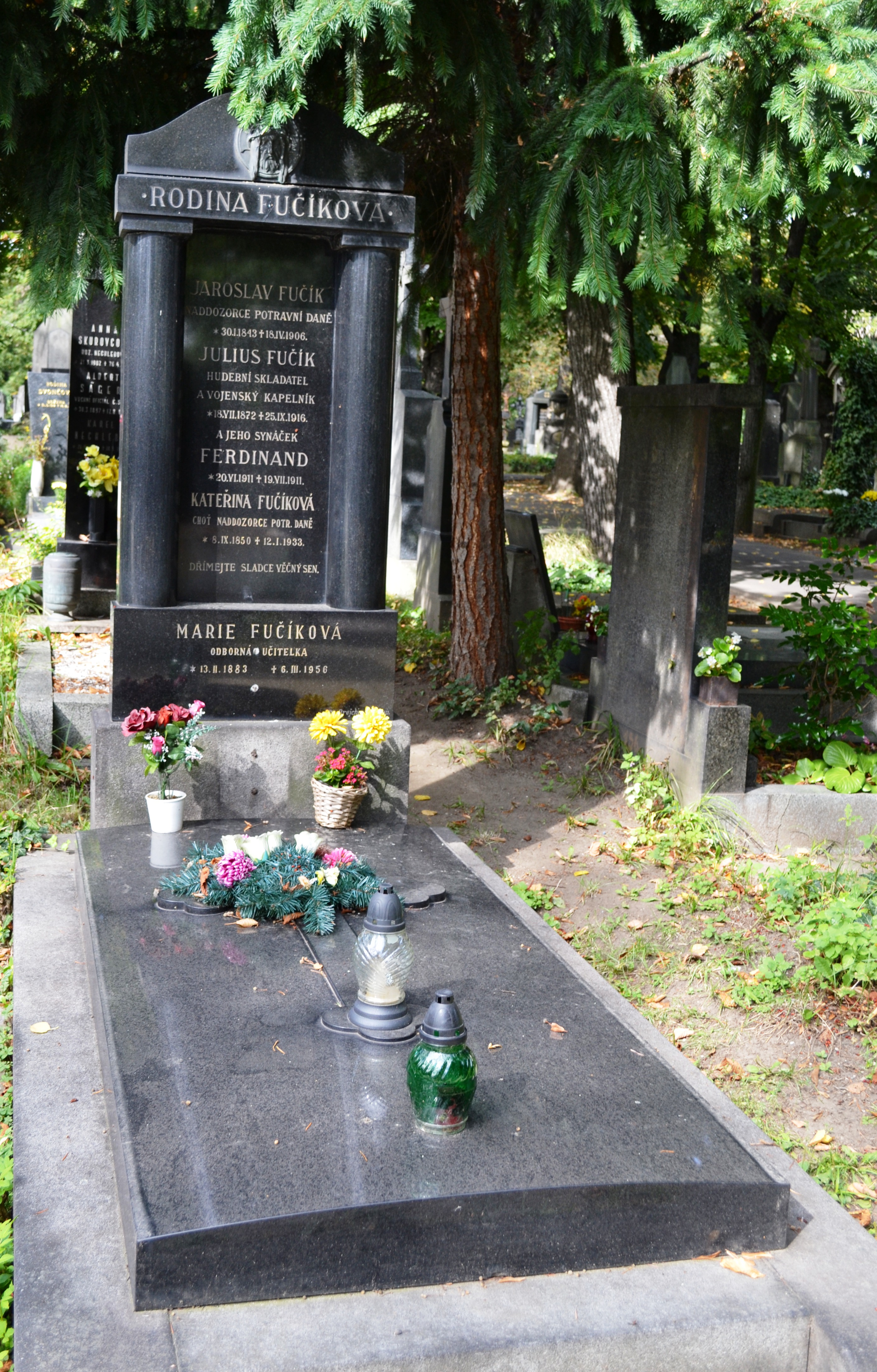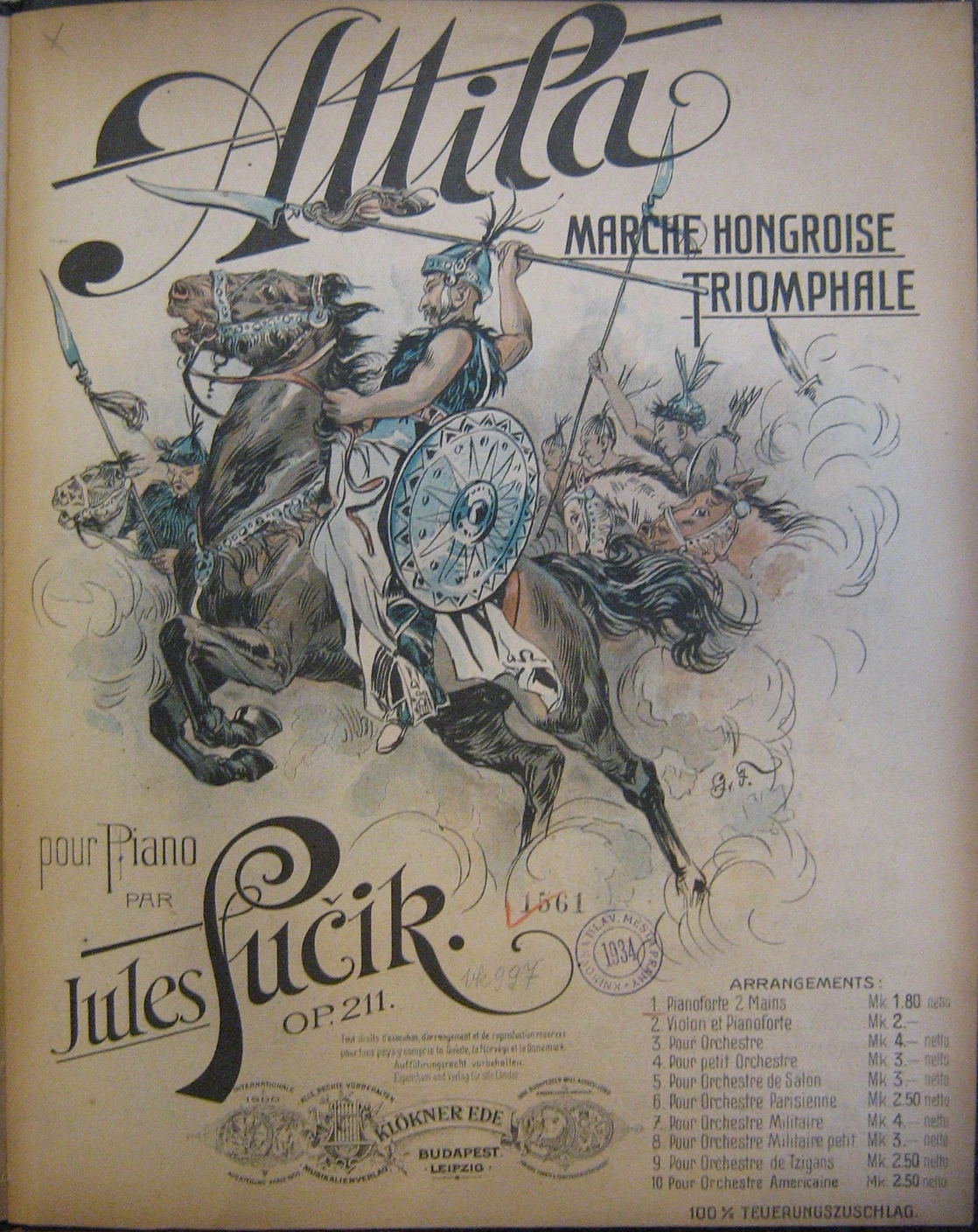1. Biography
Julius Fučík's life was deeply intertwined with his musical career, spanning from his early education under renowned composers to his extensive service as a military bandmaster and his later endeavors in music publishing.
1.1. Birth and Early Life
Fučík was born in Prague, Bohemia, on July 18, 1872, when Prague was part of the Austro-Hungarian Empire. He was the brother of opera singer Karel Fučík and the uncle of the journalist Julius Fučík, who shared his name.
1.2. Education and Musical Studies
As a student, Fučík developed proficiency in various instruments. He learned to play the bassoon under Ludwig Milde, the violin with Antonín Bennewitz, and also studied various percussion instruments. He later pursued significant composition lessons under the tutelage of the esteemed composer Antonín Dvořák.
1.3. Military Career
In 1891, Fučík embarked on his military career, joining the 49th Austro-Hungarian Regiment as a military musician. He initially performed in Krems by the Danube under the direction of Josef Wagner, and later served in a military band in Vienna.
After a period of civilian work, he rejoined the army in 1897, taking on the role of bandmaster for the 86th Infantry Regiment, which was stationed in Sarajevo. It was shortly after this appointment that he composed his most famous piece, Einzug der Gladiatoren or "Entrance of the Gladiators".
In 1900, Fučík's band was relocated to Budapest. Here, he found opportunities to have his compositions played by eight regimental bands, though he also faced increased competition for recognition. With a larger pool of musicians at his disposal, Fučík began to explore and experiment with transcriptions of orchestral works. In 1907, while in Budapest, he composed another notable march, "The Florentiner March."
In 1910, Fučík moved once more, returning to Bohemia where he became the bandmaster of the 92nd Infantry Regiment in Theresienstadt. At that time, this band was considered one of the finest in the Austro-Hungarian Empire. Fučík toured extensively with them, giving concerts in cities such as Prague and Berlin, attracting audiences of over 10,000 people.
1.4. Civilian Activities
In 1894, Fučík temporarily left the military to take up a position as the second bassoonist at the German Theatre in Prague. A year later, he became the conductor of the Danica Choir in the Croatian city of Sisak. During this period, Fučík also served as the chief conductor of the Prague City Orchestra and composed a number of chamber music pieces, primarily for the clarinet and bassoon.
1.5. Berlin Activities and Later Life
In 1913, Fučík married and settled in Berlin. There, he established his own band, the Prager Tonkünstler-Orchester, and founded a music publishing company, Tempo Verlag, with the aim of marketing his own compositions. However, his fortunes began to decline with the outbreak of World War I. The hardships and privations of the war led to the failure of his business and a deterioration of his health.
1.6. Death
Julius Fučík died in Berlin on September 25, 1916, at the age of 44, following a sudden illness. He is interred in Vinohrady Cemetery in Prague.

2. Musical Career and Works
Julius Fučík's musical career was distinguished by his prolific output and his significant contributions to band music, particularly marches, earning him widespread recognition.
2.1. Musical Style and Influences
Fučík was a highly prolific composer, with over 400 compositions to his name, predominantly for military bands. His compositional style was influenced by his studies under Antonín Dvořák. He earned the moniker "Bohemian Sousa" due to the extensive number of marches he composed, drawing parallels to the American march king, John Philip Sousa.
2.2. Marches
Fučík's most renowned works are his marches, which have achieved enduring popularity worldwide.

- "Entrance of the Gladiators" (Vjezd gladiátorů, Einzug der Gladiatoren) Op. 68 (1897): Originally titled Grande Marche Chromatique due to its use of chromatic scales, Fučík renamed it reflecting his interest in Roman history. In 1910, Canadian composer Louis-Philippe Laurendeau arranged the piece for a smaller band under the title "Thunder and Blazes," which is the version most widely known today. This arrangement became universally associated with the appearance of clowns in circus performances and is also known by the nickname "Screamer."
- "Florentiner March" (Florentinský pochod, Florentiner Marsch) Op. 214 (1907): This march is another of Fučík's most popular compositions, widely performed in Europe and the United States.
Other notable marches include:
- Salve Imperator Op. 224 (1898)
- Danubia Op. 229 (1899)
- Triglav Op. 72 (1900)
- Pod admirálskou vlajkou (Under the Admiral's Flag) (1901)
- Mississippi River (1902)
- Fantastický pochod (Marche fantastique) (1902)
- Stále vpřed (Sempre avanti) (Always Forward) (1904)
- Stráž Slovanstva (Guard of Slavdom) (1907)
- Veselí venkovští kováři (The Merry Village Blacksmiths) (1908)
- Hercegovac Op. 235 (1908)
- Boží bojovníci (God's Warriors) (1911)
- Vítězný meč (Victorious Sword) (1913)
- Zvuky fanfár (Sounds of Fanfares) (1914)
- Schneidig vor Op. 79
- Vojenský (Il soldato) Op. 92
- Stále kupředu Op. 149
- Die Regimentskinder Op. 169 (The Regiment's Children)
- Attila Op. 211
- Die Lustigen Dorfschmiede Op. 218 (The Merry Village Blacksmiths)
- Uncle Teddy Op. 239
- Furchtlos und Treu Op. 240 (Fearless and Loyal)
- Die Siegesschwert Op. 260 (The Victory Sword)
- Leitmeritzer Schuetzenmarsch Op. 261
- Einzug der Olympischen Meisterringer Op. 274 (Entry of the Olympic Master Wrestlers)
- Fanfarenklaenge Op. 278 (Fanfare Sounds)
- Erinnerung an Trient Op. 287 (Memory of Trent)
- Siegestrophaen Op. 297 (Victory Trophies)
- Gigantic Op. 311
- Sarajevo-Marsch Op. 66
2.3. Waltzes and Polkas
Fučík also contributed to other popular genres, composing a number of waltzes and polkas:
- Ideály snů (Dream Ideals) Op. 69 - waltz (1900)
- Od břehu Dunaje (Vom Donauufer, From the Banks of the Danube) Op. 135 - waltz (1903)
- Escarpolette - waltz (1906)
- Starý bručoun (The Old Grumpy Man) - virtuoso polka for bassoon (1907)
- Zimní bouře (Winter Storm) Op. 184 - waltz (1907)
- Dunajské pověsti (Danube Legends) Op. 233 - waltz (1909)
- Baletky (Ballerinas) Op. 226 - waltz (1909)
- Liebesflammen Op. 248 - waltz
- Tanec milionů Op. 121 - waltz
2.4. Other Compositions
Beyond marches, waltzes, and polkas, Fučík composed a variety of other musical works:
- Concert overtures: Marinarella Op. 215 (1907) and Miramare Op. 247 (1912)
- Symphonic suite: Život (Life) (1907)
- Overture: St. Hubertus Op. 250
- Requiem Op. 281
- Chamber compositions, particularly for clarinet and bassoon.
3. Legacy and Impact
Julius Fučík's music continues to have a significant and enduring impact, maintaining its presence in both classical and popular culture.
3.1. Popular Recognition
His marches remain widely performed as patriotic music in the Czech Republic. "Entrance of the Gladiators" in particular has achieved universal recognition, serving as the quintessential theme for circus clowns around the world.
3.2. Cultural Impact
The influence of Fučík's compositions extends into popular culture. A 1976 barrel organ recording of his classic march Die Regimentskinder by the C. John Mears Organisation is prominently featured in the popular Atari Interactive video game RollerCoaster Tycoon.
4. Personal Life
4.1. Family
Julius Fučík was connected to other notable figures in his family. His brother, Karel Fučík, was an opera singer, and his nephew, also named Julius Fučík, became a prominent journalist.